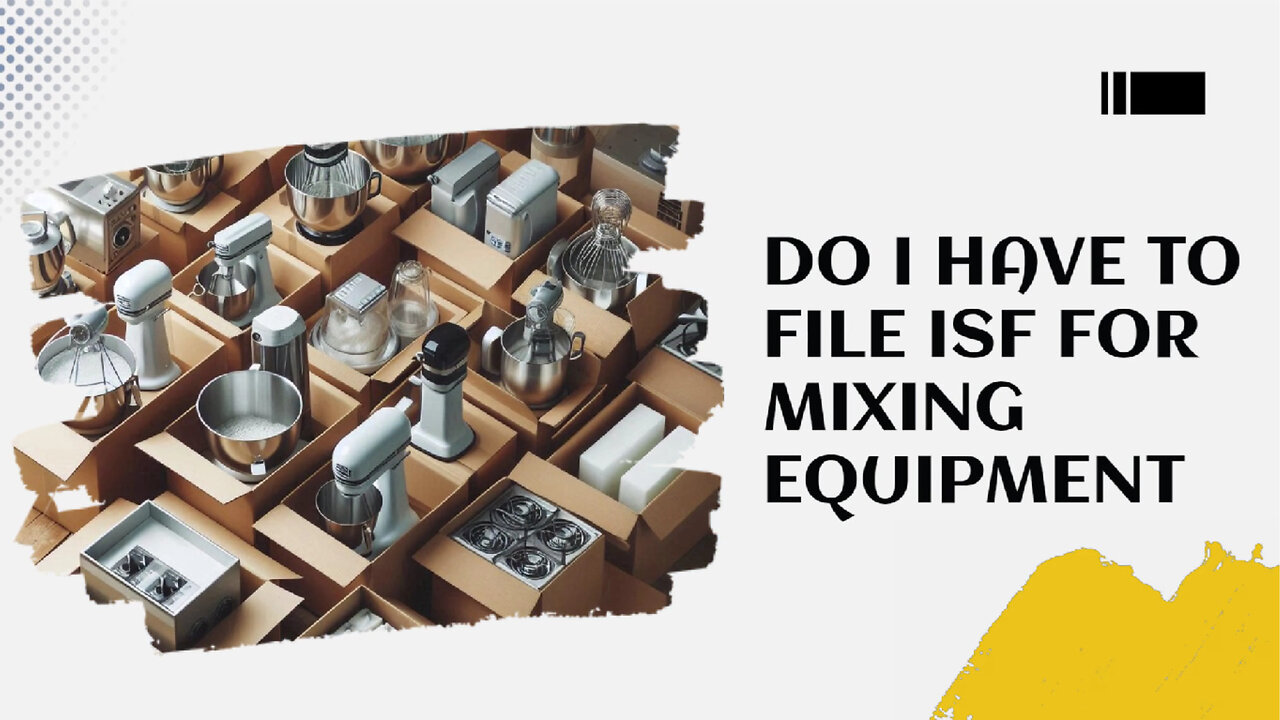Premium Only Content

Navigating ISF Filing for Mixing Equipment: What You Need to Know
ISF Cargo | Phone: 786-865-0459
Email: isf@isfcargo.com | https://isfcargo.com
In summary, when it comes to importing mixing equipment, the need to file an Importer Security Filing (ISF) depends on the specifics of your shipment. If the equipment is being imported by ocean vessel, then the general rule is that ISF must be filed. However, there are exceptions to this rule. One exception is when the goods are being imported as part of a single consolidated container, in which case the responsibility to file the ISF lies with the carrier or the Non-Vessel Operating Common Carrier (NVOCC).
It is essential to communicate with your freight forwarder or customs broker to ensure that the ISF requirements are being met for your specific shipment. The ISF filing requires ten data elements, including information on the seller or owner of the goods, the buyer or owner of the goods, the importer of record number or bond number, the consignee number(s), the manufacturer or supplier, the ship-to party, the country of origin, the Harmonized System (HS) tariff number, the container stuffing location, and the consolidator's (stuffer's) name and address.
It is important to note that while ISF is a crucial part of the importing process, it is not the same as a customs bond. A customs bond acts as an insurance policy that guarantees the payment of duties and taxes to U.S. Customs and Border Protection (CBP) and is required for all commercial shipments entering the United States. However, it is not directly related to the filing of ISF.
To ensure compliance with customs requirements, it is always essential to work closely with your customs broker or freight forwarder. By staying informed and up-to-date with relevant regulations, you can avoid potential issues and ensure a smooth importing process for your mixing equipment.
#usimportbond
#isfcustomsbroker
#uscustomsclearing
#isfentry
Video Disclaimer Here: This content is for educational use and not associated with any US government body.
0:34 - The Importer Security Filing (ISF) is a document required by U.S. Customs and Border Protection (CBP) for imported goods, which helps assess security risks. Generally, if mixing equipment is imported by ocean vessel, an ISF must be filed.
1:19 - If the mixing equipment is part of a consolidated container, the responsibility for filing the ISF shifts to the carrier or Non-Vessel Operating Common Carrier (NVOCC). It’s important to communicate with your customs broker or freight forwarder to clarify ISF obligations.
1:49 - While ISF is essential for importing, it differs from a customs bond, which guarantees the payment of duties and taxes on commercial shipments. Always collaborate with professionals to ensure compliance with all regulations related to your shipment.
-
 18:37
18:37
Clownfish TV
5 hours agoThe Oscars Just EMBARASSED Disney and Emilia Pérez...
41.5K16 -
 56:28
56:28
Glenn Greenwald
7 hours agoDocumentary Exposing Repression in West Bank Wins at Oscars; Free Speech Lawyer Jenin Younes on Double Standards for Israel's Critics | SYSTEM UPDATE #416
95.7K80 -
 1:03:34
1:03:34
Donald Trump Jr.
9 hours agoZelensky Overplays His Hand, More Trump Wins, Plus Interview with Joe Bastardi | Triggered Ep.221
145K121 -
 1:13:16
1:13:16
We Like Shooting
18 hours ago $4.87 earnedDouble Tap 399 (Gun Podcast)
39.9K1 -
 1:00:20
1:00:20
The Tom Renz Show
1 day agoTrump Schools Zelensky, The Epstein Files FAIL, & What RFK Will Mean for Cancer
41.1K18 -
 42:47
42:47
Kimberly Guilfoyle
11 hours agoThe Trump effect: More Major Investment, Plus America First at Home & Abroad. Live w/Ned Ryun & Brett Tolman | Ep. 201
122K43 -
 1:29:23
1:29:23
Redacted News
9 hours agoWW3 ALERT! Europe pushes for war against Russia as Trump pushes peace and cutting off Zelensky
164K277 -
 57:56
57:56
Candace Show Podcast
13 hours agoHarvey Speaks: The Project Runway Production | Ep 1
151K94 -
 56:31
56:31
LFA TV
1 day agoEurope’s Relationship With America Is Over | TRUMPET DAILY 3.3.25 7PM
46.3K7 -
 2:04:45
2:04:45
Quite Frankly
11 hours ago"European Deth Pact, Blackout Data Breach, Epstein" ft. Jason Bermas 3/3/25
46.8K16